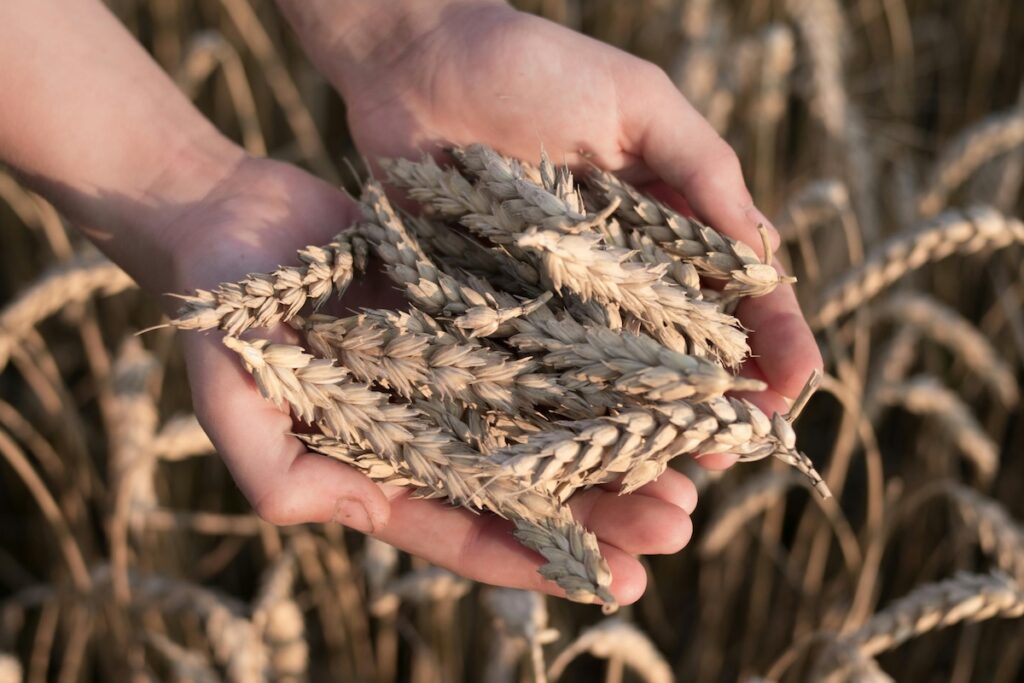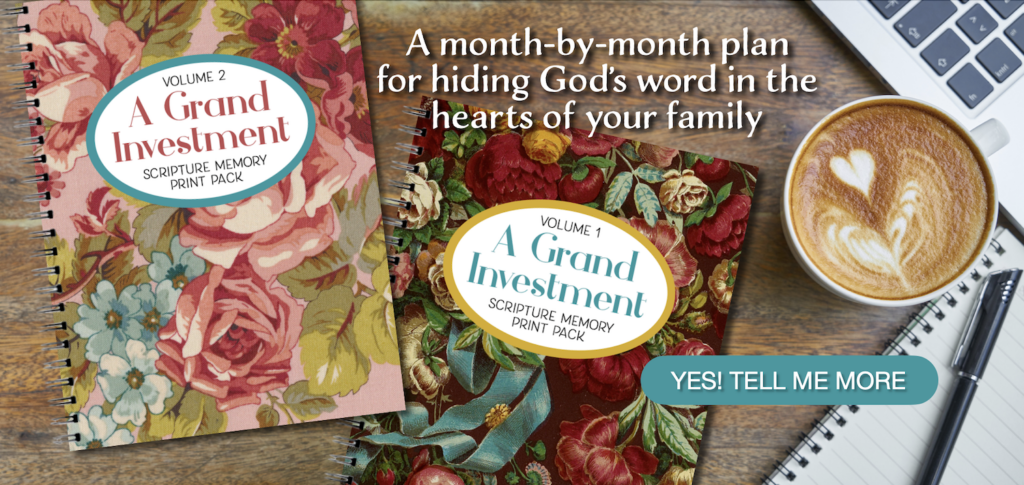EP 99: Living a Yielded Life

Jesus calls believers to deny themselves, take up their cross, and follow Him. But what does a life wholly yielded to God even look like in this day and age? It is marked by a willingness to:
We are unpacking all that and more this week on the Loving Life at Home Podcast. I hope you’ll listen in and be encouraged.
Show Notes
VERSES CITED:
- John 12:23-24 – “…unless a grain of wheat falls into the earth and dies, it remains alone; but if it dies, it bears much fruit.’”
- Matthew 16:24 – “Then Jesus said to His disciples, “If anyone wishes to come after Me, he must deny himself, and take up his cross and follow Me.” (see also Luke 9:23 and Mark 8:34)
- Mark 8:35 – “For whoever wants to save his life will lose it, but whoever loses his life for My sake and the gospel will save it.”
- 1 John 2:17 – “The world and its desires pass away, but whoever does the will of God lives forever.”
- 1 Corinthians 10:31 – “Whether, then, you eat or drink or whatever you do, do all to the glory of God.”
- Philippians 1:21 – “For me, to live is Christ, and to die is gain.”
- Luke 22:42 – “Father, not my will, but thine be done.”
- Hebrews 12:1 – “… let us run with perseverance the race marked out for us.”
- 2 Timothy 4:7 – “I have fought the good fight, I have finished the course, I have kept the faith”
- Ephesians 2:10 – “For we are His workmanship, created in Christ Jesus for good works, which God prepared beforehand so that we would walk in them.”
- 1 Corinthians 2:14 – “The unbeliever does not receive the things of the Spirit of God, for they are foolishness to him. And he cannot understand them, because they are spiritually discerned.”
- 1 Corinthians 1:27 – “God has chosen the foolish things of the world to shame the wise, and God has chosen the weak things of the world to shame the things which are strong,”
- Romans 8:28 – “And we know that God causes all things to work together for good to those who love God, to those who are called according to His”
- Hebrews 10:23 – “Let us hold fast the confession of our hope without wavering, for He who promised is faithful.”
- Psalm 100:5 – “…the LORD isgood; his mercy is everlasting; and his truth endures to all generations.”
- Jeremiah 29:11 – “For I know the plans I have for you,” declares the LORD, “plans to prosper you and not to harm you, plans to give you hope and a future.”
- Psalm 119:105 – “Thy word isa lamp unto my feet, and a light unto my path.”
- Ephesians 2:4-10 – “But God, being rich in mercy, because of His great love with which He loved us, even when we were dead in our transgressions, made us alive together with Christ…”
- Isaiah 45:9 – “Woe to the one who quarrels with his Maker— An earthenware vessel among the vessels of earth! Will the clay say to the potter, ‘What are you doing?’ Or the thing you are making say, ‘He has no hands ‘?
- Romans 9:20-21 – “…Does not the potter have the right to make from the same lump of clay one vessel for special occasions and another for common use?”
- John 3:30 – “He must increase; I must decrease.”
- Philippians 1:27-29 – “For it has been granted to you on behalf of Christ not only to believe in Him, but also to suffer for Him.”
- Philippians 3:10 – “That I might know Him and the power of His resurrection and the fellowship of His sufferings, being conformed to His death….”
- John 16:33 – “These things I have spoken unto you, that in Me you might have peace. In the world you will have tribulation, but be of good cheer, I have overcome the world.”
- Psalm 23:4 – “Even though I walk through the valley of the shadow of death, I fear no evil, for You are with me; Your rod and Your staff, they comfort me.”
- Matthew 10:28 – “Don’t be afraid of those who want to kill your body; they cannot touch your soul. Fear only God, who can destroy both soul and body in hell.”
- 2 Corinthians 12:8-9 – “My grace is sufficient for you, for my power is made perfect in weakness.”
- Hebrews 12:2 – “…fixing our eyes on Jesus, the author and perfecter of faith, who for the joy set before Him endured the cross, despising the shame, and has sat down at the right hand of the throne of God.”
- Job 2:9 – “Then his wife said to him, ‘Do you still hold fast your integrity? Curse God and die!’”
- Job 1:21 – “He said, ‘Naked I came from my mother’s womb, And naked I shall return there. The LORD gave and the LORD has taken away. Blessed be the name of the LORD.’”
- John 14:6 – “I am the way and the truth and the life. No one comes to the Father except through me.”
- 1 Corinthians 11:1 – “Follow my example, as I follow the example of Christ.”
- Jeremiah 17:9 – “The heart is more deceitful than all else And is desperately sick; Who can understand it?”
- Hebrews 13:8 – “Jesus Christ is the same yesterday and today and forever.”
- Matthew 25:35 – “Heaven and earth will pass away, but My words will not pass away.”
- Luke 10:27 – “Love the Lord thy God with all your heart and soul and mind and strength… and love your neighbor as yourself.”
- John 13:35 – “By this will all men know you are my disciples, if you love one another.”
- Philippians 2:3 – “Do nothing out of selfish ambition or vain conceit. Rather, in humility value others above yourselves.”
- Galatians 6:3 – “If anyone thinks he is something when he is nothing, he deceives himself.”
- Romans 12:3 – “Do not think of yourself more highly than you ought…”
- Hebrews 3:14 – “… exhort one another daily, as long as it is called today, so that none of you may be hardened by sin’s deceitfulness.”
RELATED LINKS:
- Jim Elliot Was Not First to Say It – references Matthew Henry’s biography of his father
- “For His Glory and My Good” – CityAlight praise song
- Chronicles of Prydain by Lloyd Alexander – some of my husband’s favorite books
- M Is for Mama Podcast: Episode 113 – a conversation between Abbie and me
- Suffering is Never for Nothing by Elisabeth Elliot
- EP 28:Bible Memory Tips & Tricks
- EP 85: Memorize Proverbs 3 with Me
- A Grand Investment – the Bible memory program I use with my kids & grandkids
- “Inspiration” – this poem by Henry David Thoreau contains the line I quoted without attribution, “Time cannot bend the line which God hath writ”
- “God Hath Not Promised” – the poem I quoted by Annie Johnson Flint
STAY CONNECTED:
- Subscribe: Flanders Family Freebies -weekly themed link lists of free resources
- Instagram: @flanders_family – follow for more great content
- Family Blog: Flanders Family Home Life – parenting tips, homeschool help, printables
- Marriage Blog: Loving Life at Home– encouragement for wives, mothers, believers
- My Books: Shop Online – find on Amazon, at Barnes & Noble, or through our website
How to Live a Yielded Life
Full Transcript for Episode 99
Hello, friend. Welcome to Episode 99 of Loving Life at Home. Today, I’d like to discuss living a life that is wholly yielded to God. What would doing such a thing even look like?
It’s a good question to ask right now, while Charlie Kirk’s life and legacy are—for good reason — still dominating the headlines and social media feeds and thoughts and prayers of so many. More than 100 thousand people, including some personal friends of mine, attended his memorial service in Arizona on Sunday. And 100 million people, my children and I included, streamed the 5-hour long event on that first day alone. Millions more will undoubtedly see clips from the video in days to come.
The stunning thing about all of this is that the gospel message of full forgiveness freely offered through the substitutionary death and bodily resurrection of Christ was so clearly proclaimed by nearly every person who spoke at the memorial service.
One of my favorite speakers was Dr. Ben Carson, who closed his remarks by reading John 12:24 and asked that we remember the fact that Charlie was shot at 12:24 PM while we listened.
I want to read that passage, as well, in case you missed hearing it on Sunday. But I’m going to start at John 12:23, because when I looked up the timeline of the assassination to verify what Carson said, I noticed some news sources say the shooting started a minute earlier.
So keeping in that fact in mind, listen to these verses. John 12:23 reads, “But Jesus answered them by saying, ‘The hour has come for the Son of Man to be glorified.’”
If you consider that “Son of Man” is a name Jesus used to refer to Himself, He’s saying, “The hour has come for Jesus Christ to be glorified.” Then He elaborates in John 12:24, “Truly, truly I say to you, unless a grain of wheat falls into the earth and dies, it remains alone; but if it dies, it bears much fruit.”
Well, we are now getting our first glimpse of the bountiful harvest that is bursting forth in every corner of the globe as a result of Charlie Kirk’s murder. Charlie once noted, “All death can do to a believer is deliver him to Jesus,” which is exactly what happened two weeks ago. And Charlie remained faithful to share Christ’s love with others, literally to his dying breath and beyond, thanks to all the video footage he left behind.
What a legacy!
To live a yielded life, you must die to self
Of course, God hasn’t call all of us to be martyrs for our faith. (At least, not yet.) But He has called every believer, individually and unequivocally, to deny ourselves, take up our cross, and follow Him. (You can find that charge in Matthew 16:24, in Mark 8:34, and also in Luke 9:23). Jesus goes on to explain, “For whoever wants to save his life will lose it, but whoever loses his life for My sake and for the gospel will save it.”
This reminds me of something Jim Elliot famously said. Elliot was one of five missionaries killed in Ecuador by the natives they’d come to evangelize, but before he was ever martyred, Elliot wrote in his journal: “He is no fool who gives away what he cannot keep, to gain what he cannot lose.”
Interestingly, he was not the first person to observe this truth. Bible commentator Matthew Henry ascribed essentially the same quote to his own father more than two centuries earlier. Only Philip Henry said it this way: “He is no fool who parts with that which he cannot keep, when he is sure to be recompensed with that which he cannot lose.”
Either way, the point is the same. “This world is passing away, along with its desires; but whoever does the will of God remains forever,” as noted in 1 John 2:17.
Ultimately, Jesus is the only one who can fully satisfy our restless nature or fill the God-shaped hole in every human heart. In fact, turning our life over to Him and living for His glory is the whole reason each of us was created in the first place. As the Westminster Catechism asserts: “The divine end of man is to glorify God and enjoy Him forever.”
That is living a yielded life, in a nutshell:
- It’s the believer who, whether he eats or drinks or whatever he does, does it all for the glory of God. (1 Corinthians 10:31)
- It’s the person who proclaims with Paul in Philippians 1:21, “For me, to live is Christ, and to die is gain.”
- It’s the heart that prays the same prayer Jesus prayed in the garden the night He was betrayed: “Father, not my will, but thine be done.” (see Luke 22:42)
- It’s the bold prayer Erika Kirk told us her husband routinely prayed, “God, use me in whatever way you want.”
God had obviously been honoring that prayer all along in Charlie’s life, but He honored it again on September 10, 2025. As soon as I heard that he had been killed, I was heartbroken for his family, but I was also confident that Charlie had run with endurance the race that was marked out for him (see Hebrews 12:1). He had fought the good fight, finished the course, and kept the faith. (2 Timothy 4:7). He had completed the good works that God had prepared beforehand for him to do while on this earth. (Eph. 2:10)
I hope the same may be said of me when it’s my time to go.
To be sure, there is still work to be done, but not by Charlie. As Erika said at his memorial service, Charlie died with incomplete work, but not with unfinished business. He was ready to go the minute God called him.
Any remaining work will need to be done by those he left behind. Including you and me and every other person who is willing to exalt the name of Jesus every day in every way we can.
To live a yielded life, you must trust God completely
But let’s go back to the idea that only Jesus can completely fill the God-shaped hole in every human heart. Our church frequently sings a CityAlight song that touches on that idea. It goes like this:
“For Your Glory and My Good”
Verse 1
I have seen my Father’s glory
Revealed in Jesus Christ
And the more that I behold Him
The more He satisfies
When I gaze upon His beauty
When I see Him as I should
Then my eyes are lifted upward
For His glory and my good
Verse 2
There is hope in every trial
For I can trust the Lord
He will turn my heart towards Him
And help me bear the thorn
So in faith I follow Jesus
On the road not understood
For I know that He is working
For His glory and my good.
When I first heard that second verse – the part about following Jesus on the road not understood? – I assumed it was just talking about the fact that the WORLD doesn’t understand the path believers follow. Because, as Paul wrote in 1 Corinthians 2:14, “The unbeliever does not receive the things of the Spirit of God, for they are foolishness to him. And he cannot understand them, because they are spiritually discerned.”
And, as he noted in 1 Corinthians 1:27, “God has chosen the foolish things of the world to shame the wise, and God has chosen the weak things of the world to shame the things which are strong,”
But that isn’t the only way to interpret the words of this praise song. One Sunday morning as we were singing this song in church, it struck me that God sometimes calls us to follow a path we ourselves don’t understand.
Whenever that’s the case, our goal should be to trust Him and to faithfully keep following anyway, knowing that He has promised to work all things together for the good of those who love God and are the called according to His purpose. (as explained in Romans 8:28)
So, as Hebrews 10:23 reminds us to do, “Let us hold fast to our hope without wavering, for He who promised is faithful.”
That’s why we can keep on hoping and keep on trusting that God has everything under control. Nothing takes Him by surprise.
We can fully trust His goodness.
Psalm 119:105 assures us, “…the LORD is good; his mercy is everlasting; and his truth endures to all generations.”
We can fully trust His plan
Jeremiah 29:11 reads, “For I know the plans I have for you,” declares the LORD, “plans to prosper you and not to harm you, plans to give you hope and a future.”
We can fully trust His Word.
Psalm 119:105 – “Thy word is a lamp unto my feet, and a light unto my path.”
To live a yielded life, you must know (and obey) God’s Word
Of course, to trust His Word, it’s vitally important that we know His Word.
We need to read it faithfully. Memorize it. Study it. Meditate on it. Hide it deep, deep down in our heart of hearts.
That’s one reason I’m so excited about the memory work project I’ve been doing with my kids and grandkids for the past couple of years. I’ve told you about that before, and I’ll put a link to that episode in today’s show notes, along with information about the exact passages we’ve been learning plus resources to help make memorizing easier.
Most kids can memorize without a lot of effort. Their little brains are like sponges. I’ve been trying to get my grandkids to commit Ephesians 2:4-10 to memory, which was the passage I assigned for our family memory challenge last month, but they’d been dragging their feet.
Well, my 15-year-old grandson, Chase, finally sat down to work on it yesterday afternoon and had all seven verses down cold after about 15 minutes of study. He had me print the passage out for him, then copied it down in his own hand a couple of times, then quoted it to me from memory perfectly.
I wanted to make sure he didn’t just store it in short-term memory long enough to mark that one off his list, so when Grandpa got home a few hours later, I asked Chase to quote it to him, as well, which he did flawlessly, with no further cramming.
I know I’ve shared this story before, but last year, my youth pastor whom I hadn’t seen in more than 40 years came back to my hometown for a reunion with the young people he served back in the 1980s.
Well during those years, he set countless Bible verses to music and taught us the songs. And while we were all gathered, I mentioned how much I appreciated his helping to hide God’s Word in our heart that way and suggested we sing a few of those old songs together right then and there, which we all did. And nearly everybody in attendance was able to sing all those verses verbatim from memory, even though it had been more than four decades since many of them had last heard or sung them.
To live a yielded life, you must submit to God’s will
Another thing that happened more than 40 years ago is that my high school boyfriend broke the arm of his dominant hand. While it was healing, he wasn’t able to move his fingers to write, but he found that he could hold a needle and thread, so I taught him how to cross stitch – and by the time the cast came off, he was hooked.
Well, at the reunion, his wife thanked me for teaching her husband that skill, because he in turn taught her, and she then taught her children. [Which, incidentally, is exactly how disciple-making is supposed to work in the CHRISTIAN walk, as well. Jesus told his disciples to go and make more disciples, then those disciples would make even more disciples, and so on and so on.]
But — that ‘s not really the point of my telling you that story. The point is, that first and only boy I ever dated before meeting my husband used to get very frustrated that the underside of his needlework looked like such a tangled mess. Threads would be running every which way, underpinning a web of knots and loose ends.
I’d been cross-stitching for years by then and usually tried to line my stitches up in such a way that my work still looked pretty and uniform, even on the back – mostly because that’s just the way my mathematical brain has always worked.
Not that the underside of a pattern makes any difference whatsoever. Once a piece is framed, nobody can tell whether the back is messy or not. The top is what matters.
And guess what? The artist, the creator, the seamstress is the one who makes the decisions, who chooses the design, who carefully places each stitch, who does all the work for his/her own pleasure and according to his/her own liking.
Something I’ve noticed over time is that the more intricate and complex a project is, the messier the reverse side of anybody’s work inevitably becomes. Which, I think, is a great analogy for the life of a believer.
My daughter and I have been re-reading the Chronicles of Prydain by Lloyd Alexander lately. These were my husband’s favorite books as a teen, and our whole family loves them now, as well, thanks to his introducing us to the series.
We just got to the part in the book where the companions come upon what they think is a deserted cottage in the Marshes of Morva. Upon letting themselves in, the find an unfinished tapestry upon a loom and can’t help but notice that the threads are all snarled and tangled and broken. That’s because, initially, the companions only see the bottom or backside of the work.
It’s the same way with us – as Abbie Halberstadt and I were discussing on her M Is for Mama Podcast a few weeks ago. I’ll be sure to link that episode in the show notes.
But as long as we’re on earth, we only see the underside of the pattern the LORD is weaving in and through our lives. We won’t and can’t fully appreciate God’s gloriously intricate design until its finished and we’re in heaven looking down upon our life from His vantage point.
Isaiah used a similar analogy. He writes in Isaiah 45:9, “Woe to the one who quarrels with his Maker— An earthenware vessel among the vessels of earth! Will the clay say to the potter, ‘What are you doing?’ Or the thing you are making say, ‘He has no hands ‘?
Paul echoes Isaiah’s words in Romans 9:20-21, “But who are you, O man, to talk back to God? Shall what is formed say to Him who formed it, “Why did You make me like this?” / Does not the potter have the right to make from the same lump of clay one vessel for special occasions and another for common use?”
Rather than striving against our maker, we need to joyfully submit. To invite and allow him to work in our life. To yield our will to His. To pray with Charlie, “Use me in whatever way you please,” and to trust Him to make something useful and/or beautiful that will bring glory to Himself.
Yet, that explains why we sometimes don’t understand the path God asks us to travel this side of heaven – because we aren’t yet able to see things from His perspective. Once we do, I’m convinced we will marvel at how he worked it all together for His glory and our good.
To Live a Yielded Life, You Must Point Others to Jesus
Which brings us back to the CityAlight song I started singing earlier. It continues:
Chorus
To our God be the glory
To our God be praise
He alone, the name above all names
I will boast ever only in the Lord my God
For I know
His glory is my good
Verse 3
See the open arms of Jesus
Upon the cross that day
What they understood as weakness
Deserves my every praise
For the charge that was against me
It was nailed into the wood
Yes, I know that He has saved me
For His glory and my good
Verse 4
Would I gladly be made nothing
That Christ would be made more
Would I seek the only kingdom
That far outweighs them all
I will stand before my Father
Where the faithful saints have stood
And with joy my heart shall praise Him
For His glory and my good
Yes, with joy my heart shall praise Him
For His glory and my good
That fourth verse poses a good question for all of us to ponder: “Would I gladly be made nothing that Christ would be made more?”
Can we say with John the Baptist, “He must increase; I must decrease”? The most significant work I can do in this life is to point others to Jesus. If my chief end is to bring glory to God and enjoy Him forever, the more I glorify God, the more I WILL enjoy Him, and the more others can enjoy Him, too.
This understanding is central to living a yielded life. It’s a desire to see Christ magnified and an eagerness for Him to use you however He sees fit for His own glory. It’s the confidence with which we trust Him, even when He works in ways or leads us down paths we don’t understand. And it is a willingness to hold our blessings with an open hand, grateful for the opportunity to enjoy them while they last, but acknowledging the fact everything we have is a gift from the LORD.
I want to point out that “holding things with an open hand” is really more a posture of the heart than a physical gesture.
My marriage is a blessing. I love my husband dearly and am so grateful to be married to him. But holding that blessing with an open hand won’t keep me from calling 9-11 and doing CPR until EMS arrives if my husband collapses from a heart attack in front of me. It will only keep me from becoming bitter toward God if he doesn’t survive the episode.
Every one of my twelve children are a blessing, and I’m so grateful for the privilege of mothering them. But holding those blessings with an open hand didn’t keep me from clinging tightly to them when they were little, to keep them safe and prevent their wandering off when we were in large crowds or unfamiliar surroundings.
But it did allow me to loosen my grip as they grew and give them the freedom to follow the LORD’s leading, even if that meant moving to the other side of the globe to work and serve in difficult situations, trusting God to protect them and provide for their every need.
To live a yielded life, you must be willing to suffer
During my Bible reading yesterday, I began Paul’s letter to the church at Philippi. In Philippians 1:27-29, he wrote, “…stand firm in one spirit, contending together as one for the faith of the gospel, without being frightened in any way by those who oppose you. This is a clear sign of their destruction but of your salvation, and it is from God. For it has been granted to you on behalf of Christ not only to believe in Him, but also to suffer for Him.”
Paul considered it a privilege to suffer for the sake of the gospel. In Philippians 3:10 he wrote about his desire to “know [Christ] and the power of His resurrection and the fellowship of His sufferings, being conformed to His death….”
In Suffering is Never for Nothing, Elisabeth Elliot observed,
“The greatest gifts of my life have also entailed the greatest suffering. The greatest gifts of my life, for example, have been marriage and motherhood. And let’s never forget that if we don’t ever want to suffer, we must be very careful never to love anything or anybody. The gifts of love have been the gifts of suffering. The two are inseparable….”
After recounting the death of her husband, she continues the same thread of thought,
“And God’s answers to my ‘Why’ was just ‘Trust me.’ No explanations. Just ‘Trust me.’ That was His message.
“Now, if I had had a faith that was determined God had to give me a particular kind of answer to my particular prayers, that faith would have disintegrated. But my faith had to be founded on the character of God Himself.”
I love that last part. It is key for all of us. If our faith is contingent on God doing everything according to OUR will, rather than yielding our will to HIS, then that faith will fall flat during difficult days.
Believing in Jesus for salvation is not a ticket to escape suffering. Quite the contrary.
Christ made this fact clear in John 16:33, “In the world you WILL HAVE tribulation… Actually, this is one of the verses my old youth pastor set to music. The whole verse reads this way: “These things I have spoken unto you, that in Me you might have peace. In the world you will have tribulation; but be of good cheer, I have overcome the world.”
Isn’t it reassuring to know that “even though I walk through the valley of the shadow of death, I [need] fear no evil, for [God] is with me. [His] rod and [His] staff, they comfort me.” (Psalm 23:4)
Safety does not depend upon the absence of danger, but on the presence of the Holy Spirit. Sure, others can do us physical damage. But as Matthew 10:28 tells us, “Don’t be afraid of those who want to kill your body; they cannot touch your soul. Fear only God, who can destroy both soul and body in hell.”
I’d rather be in the fiery furnace with the LORD, or in the lion’s den or the jail cell or even in the belly of the big fish WITH GOD than anywhere else without Him.
When I was in jr. high or high school, I came across a poem by Annie Johnson Flint who was born in the latter part of the nineteenth century. Her poem was entitled “God Hath Not Promised,” and I committed it to memory as a young girl and reflected on it often. It goes like this:
What God Has Promised
A poem by Annie Johnson Flint (1866-1932)
God hath not promised
Skies always blue,
Flower-strewn pathways
All our lives through;
God hath not promised
Sun without rain
Joy without sorrow,
Peace without pain.But God hath promised
Strength for the day,
Rest for the labour,
Light for the way,
Grace for the trials,
Help from above,
Unfailing sympathy,
Undying love.
Sometimes God receives the most glory, not by removing a hardship from our lives but by sustaining us through it.
Remember the three friends in the fiery furnace. Or Daniel in lions’ den. Or Joseph enslaved and in prison. Or David in battle with Goliath.
God could have easily kept any of those saints from facing such hardships. But He received more glory by preserving them through their difficulties. Not by preventing the trials in the first place.
Or think of Paul’s thorn in the flesh, which Paul confides in 2 Corinthians 12:8-9 that he pleaded three separate times for the LORD to take away. Yet, what was God’s answer to him? “My grace is sufficient for you, for my power is made perfect in weakness.”
That is why we need to fix our eyes on Jesus, the author and finisher of our faith. (as He’s called in Hebrews 12:2), who “for the joy set before him he endured the cross, scorning its shame, and sat down at the right hand of the throne of God.”
As long as Peter kept his gaze on Jesus, he was able to walk on water. Not until he shifted his focus to the rolling waves and howling storm that surrounded him did he start to sink below the surface.
Rarely does a life of ease and comfort produce the greatest personal growth or provide the most glory to God. Of course, that doesn’t keep me from trying to eliminate or minimize problems and struggles or pleading for the LORD’s mercy.
I’ve always prayed that God would teach me the lessons I need to learn in the gentlest way possible. That He would conform me to the image of Christ as painlessly as possible. That He would use me for His glory while sustaining me with His grace. And that He would never send such great suffering my way that I would be tempted, like Job’s wife, to “curse God and die” but would continue to faithfully affirm His goodness, even through hardship, saying, “The LORD giveth and the LORD taketh away, blessed be the name of the LORD.”
To live a yielded life, you follow Christ alone
Several years ago, one of my adult kids was telling me about the stacked stone cairns (pronounced kern) that are sometimes used to mark hiking trails. Evidently, it became a TikTok trend a while back to knock them down or even move them to another location, which resulted in lots of people getting lost. If memory serves me correctly, I think some may have even died.
That’s why it’s so important to know the map and understand it for yourself. Because sometimes the guides to whom we’re accustomed to looking for direction in this world have moved. They’ve changed positions. And now they’re dead wrong.
Sadly, we’re seeing this happen in many churches, where scripture is being twisted to say the opposite of what it has clearly taught for centuries. Or else it’s abandoned altogether in favor of some new age mumbo-jumbo or pop psychology or even pagan practices.
So bring your Bible with you to church. Weigh everything the pastor or priest or teaching elder says in light of scripture. If you’re in a church that insists all paths lead to God, get out. That’s heretical. Because Jesus said in John 14:6,
“I am the way and the truth and the life. No one comes to the Father except through me.”
The point is, we need to read and know God’s Word ourselves and follow hard after Christ.
Paul told his friends in 1 Cor 11:1, “Follow my example, as I follow the example of Christ.” That is all well and good, but unless you know about Christ’s example firsthand, how will you recognize whether the person you are imitating is staying true to Jesus’s example or not?
The point is, just like those cairns on the mountainside which had been moved off the right trail, sometimes external markers are mistaken. Praise the LORD when you find a kindred spirit who is following hard after Christ just like you are. But you still need to keep your eyes fixed on Jesus. Pursue Him whole-heartedly. Do not grow lazy and look only to human leaders or you, too, might possibly be led astray.
The same is true for inner markers. The notion of “following your heart” is some of the dumbest advice that’s ever been given. Jeremiah 17:9 tells us, “The heart is more deceitful than all else and is desperately sick; Who can understand it?”
Scrooge understood this fact. He was unwilling to trust his own senses the night Marley’s ghost came to visit him. He was convinced the ghost was a figment of his own imagination, possibly caused by something he ate that didn’t agree with him. Perhaps an undigested piece of beef or undercooked potato. He suggested there was “more about gravy than grave” to what he was seeing.
We should be similarly skeptical of our own emotions. Feelings are not facts. Our own emotions are not reliable guides nor trustworthy reflections of reality.
Beware of making decisions when you’re hungry, angry, lonely, tired, jealous, discouraged, or confused. All these things affect the way we feel at any given moment.
Emotions fluctuate. Feelings are fickle. But “Jesus Christ is the same yesterday, today, and forever,” as we read in Hebrews 13:8. Time cannot bend the line that God hath writ. (Thoreau?) Heaven and earth may pass away, but the Word of God will stand forever. (see Matthew 25:35)
To live a yielded life, you must love others selflessly
When asked about the greatest commandment, Jesus said, “Love the Lord thy God with all your heart and soul and mind and strength… and love your neighbor as yourself.” He also told His followers, “By this will all men know you are my disciples, if you love one another.”
Love God. Love Others. That sums it up, doesn’t it?
But what does that love look like? Shouldn’t that love – true love – point others to the God who IS love? Shouldn’t it speak the truth and point to Christ, who declared Himself the Way, the Truth, the Life, and the one and only path to the Father?
Shouldn’t that sacrificial kind of love look out for the interests of others with the same urgency as we attend to your own? ( Philippians 2:3)
Selfless love is humble. It takes Galatians 6:3 to heart: “If anyone thinks he is something when he is nothing, he deceives himself.” Or Romans 12:3: “Do not think of yourself more highly than you ought…” Instead, in humility of mind, it regards one another as more important than yourself. “
It yields itself completely to God and, as Hebrews 3:14 bids us to do, it “… exhort[s] one another daily, as long as it is called today, so that none of you may be hardened by sin’s deceitfulness.” (Hebrews 3:14)
That’s my goal with this podcast. To exalt the name of Jesus and to encourage others to do the same. What are your thoughts about living a yielded life? I’d love to hear from you if you have time to drop me a line and let me know.
LORD willing, I’ll be back again next week with another episode. May He bless and keep you until then.
More Bible Memory Help
Want a month-by-month plan filled with resources to make hiding God’s Word in your heart a habit? Check out my new Grand Investment print packs.
I’ve packed both volumes full of pretty, pertinent printables: copywork and coloring pages, award certificates, and tracking charts, along with links to videos and songs I’ve used both in memorizing Bible passages myself and in encouraging my kids and grandkids to do the same.







This was a powerful and inspiring reflection, full of scripture and personal stories that deeply resonated. The message about yielding to Gods will and following Christ alone is both challenging and comforting.